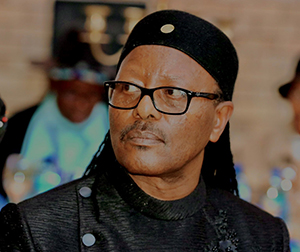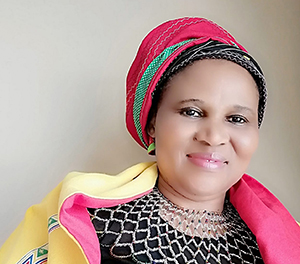News & Events
To know yourself, know your roots
The Unisa Women’s Forum (UWF), under the stewardship of Professor Meahabo Magano, celebrated Heritage Day on 15 September 2022. The theme for this event was “Heritage and self-identity: Knowing your roots”, with the sub-theme “Ndingubani, Ke mang, Who am I?”.
Welcoming the guests, Nozuko Langa (UWF Deputy Chairperson) explained what “heritage” really means to the UWF. She cited the spirit of ubuntu as the identity and strength of the UWF. She further appealed to the government to collaborate with Unisa in an endeavour to root out gender-based violence.
Magano, the UWF Chairperson, in setting the tone for the event, emphasised that in line with the precepts of our heritage, the UWF is a structure that embraces the concept of ubuntu and diversity. “The UWF does not only advocate for ubuntu, but it walks the talk,” she pointed out.
She encouraged the audience to express themselves during the session to showcase who they were as imbokodo, “the rock-igneous rocks”, citing their clan names on both maternal and paternal sides. She further informed the audience that the UWF consisted of women of valour whose heritage as the UWF is strength and whose forum is ethical and operating with integrity and respect. “These are the values our institution is built on,” concluded Magano.
Who are we?
Delivering the keynote address, Professor Monde Ntwasa, Acting Deputy Executive Dean of the College of Agriculture, posed a question to the audience: Who are we? “This is a question all of us have but one that we have decided to lock up at the back of our minds as Africans, as blacks,” he said.

Prof Monde Ntwasa (Acting Deputy Executive Dean: Unisa's College of Agriculture)
In addressing this critical question, Ntwasa reminded the audience of the damage that has been inflicted on black people over many centuries, identified the source of their seemingly irreversible situation and further invited the audience to join him in pondering what needs to be done in order to answer the question.
Why must we ask this question?
In addressing the question, Ntwasa said that he would use the term “African” because this is what we are called. “It is not to express that I understand what it means or its origin. That alone – not knowing why we are called Africans – is telling about our state as a people,” he said. He further argued that current literature claims (among many) that the name was given to the continent via the Romans who referred to Tunisia (Carthage then) as Afri-terra. We also learnt that ancient Africans (Moors, Egyptians, Tunisians [Khart-Hadians], Ethiopians, Nubians etc.) called the land Alkebul-an – The Land of the Blacks. Therefore, he used the term “African” for convenience in answering the question: “Who are we?”.
Ntwasa highlighted that one day, not so long ago, he had the sudden realisation that there was nowhere on the planet where Africans were free – where they do not have to defend their humanity, where their existence is not linked to servitude, subservience and lack of an unequivocal identity. “This, to me, could not be without meaning,” he said. “The most painful part for me is the realisation that our history is not just distorted. It has largely been systematically and deliberately erased over many centuries.”
Ntwasa mentioned that he had also become painfully aware that Africans globally were terminally injured by pernicious dehumanisation. “Primarily our critical philosophy of life, ubuntu, has been systematically eroded and distorted and is now almost non-existent,” he said. “The destruction of ubuntu is the ultimate blow to all Africans. Because of this loss, Africans, globally, do not have an independent agenda on virtually all aspects of life, especially the acquisition of knowledge, exploitation of knowledge, security, safety arrangements, etc. We cannot do any of these things except with the tutelage of a ‘master class’.
Most tragically, said Ntwasa, there are tacit messages that are extremely effective and suggest that we do not need to seek to be defined as a people. “Seeking and claiming an identity and uniqueness is very often questioned,” he continued. “Even the term ‘African’ is sometimes controversial in South Africa. You probably know we have evolved in this country from kaffirs, to plurals and to black/African. Africans abroad have gone through the same process – from negro to Afro-American, etc. Claims whose effect is to disinherit Africans as a people are often made. Europeans used to identify themselves as such in South Africa until they realised that identifying themselves as Europeans weakens their adherence to the rich African heritage.”
What is to be done?
“We have lost everything,” Ntwasa said sombrely. “We have become caricatures of our oppressors. Because we have served a system that dehumanises us, that denies us self-determination, that destroyed the core unit of ubuntu – a solid family structure, we must assume a new mindset and a determination to become truly free,” urged Prof Ntwasa.
Concluding his address, Monde Ntwasa expressed appreciation to the UWF for inviting him to speak for the first time on an academic platform about these hurtful recollections. He commended women as the best placed to drive the restoration of the African person. “We must always remember that despite the general view, the truth is that, in the household and in the community, in the nation, men are given power, but women have power,” he concluded.

Dr Nomvula Twaise (Director of Student Housing: University of Mpumalanga)
Dr Nomvula Twaise, Director of Student Housing, University of Mpumalanga, in delivering her message of support to the Unisa community, highlighted that it is critical for us to know our full DNA. Both maternal and paternal sides are very important in our identity. She expressed her perception that the destruction of the family unit is the destruction of ubuntu. She further raised a very real concern that as a nation we no longer have happy families and therefore we are too far away from answering the question: “Who are we?”
Sixolise Lugongolo, NSRC member based in the Eastern Cape Region, started the students’ message of support by quoting the words of Marcus Garvey: “people without knowledge of their past history and culture are like a tree without roots”. As students they viewed cultural heritage as the legacy of physical artefacts and intangible attributes of society inherited from the past generations, he remarked. “In every society women are guardians, creators and consumers of culture; however, they still face barriers that prevent them from playing an equal role in the cultural sphere,” he further mentioned. As students Lugongolo stated that they concurred with values espoused in the Bible, specifically Ephesians 5:23 which gives a husband the responsibility of being the head of a wife as Christ is the head of the church and the saviour of the body. However, the students made it clear that this does not give men the right to treat women badly.
On a positive note, he expressed the students’ appreciation to Unisa’s acknowledgement of transformation by appointing its first female Principal and Vice-Chancellor, Professor Puleng LenkaBula, after one hundred years of male dominance, and also for recognising women who are working hard by appointing Dr Vuyo Sigaqa as a Centre Manager at his centre in Mthatha. He further highlighted that as students they saluted women who do not lose their roots because of their positions at work, such as the late Nkosi Nokhwezi Makaula and Queen Noloyiso Sigcawu.
In concluding his speech, he condemned gender-based violence and encouraged women to appease when there were fights. He further encouraged women by saying, “zimbokodo nyathelani ngentsimbi kuze apho ninyathele khona umkhondo ungaduki”.
Dr Vuyo Sigaqa (UWF executive committee member) wrapped up the day and encouraged the audience to engage with the speeches by Ntwasa and Twaise as the way forward regarding the discussion. The audience remarked that South Africa as a nation does not have functional families and therefore the audience was given an assignment to be catalysts in restoring families. Concluding the session and based on the call made by the guest speakers, Sigaqa expressed her perception that men are hurting and consequently they take their hurt out on those that they love, which is why gender-based violence does not seem to be abating. However, women should stand up and support men to heal the wounds of the past and thus help them to return to their positions as the head of the family. This will help us answer the question: “who are we?”.
Odwa Duru, Imbongi yomthonyama, introduced the guest speaker and his poetic skills were met with ululating and applause. Ms Fratini showcased her poetic skills and Mr Olona also entertained the audience with music.
* Compiled by Dr Vuyo Sigaqa, UWF executive committee member
Publish date: 2022/10/10
